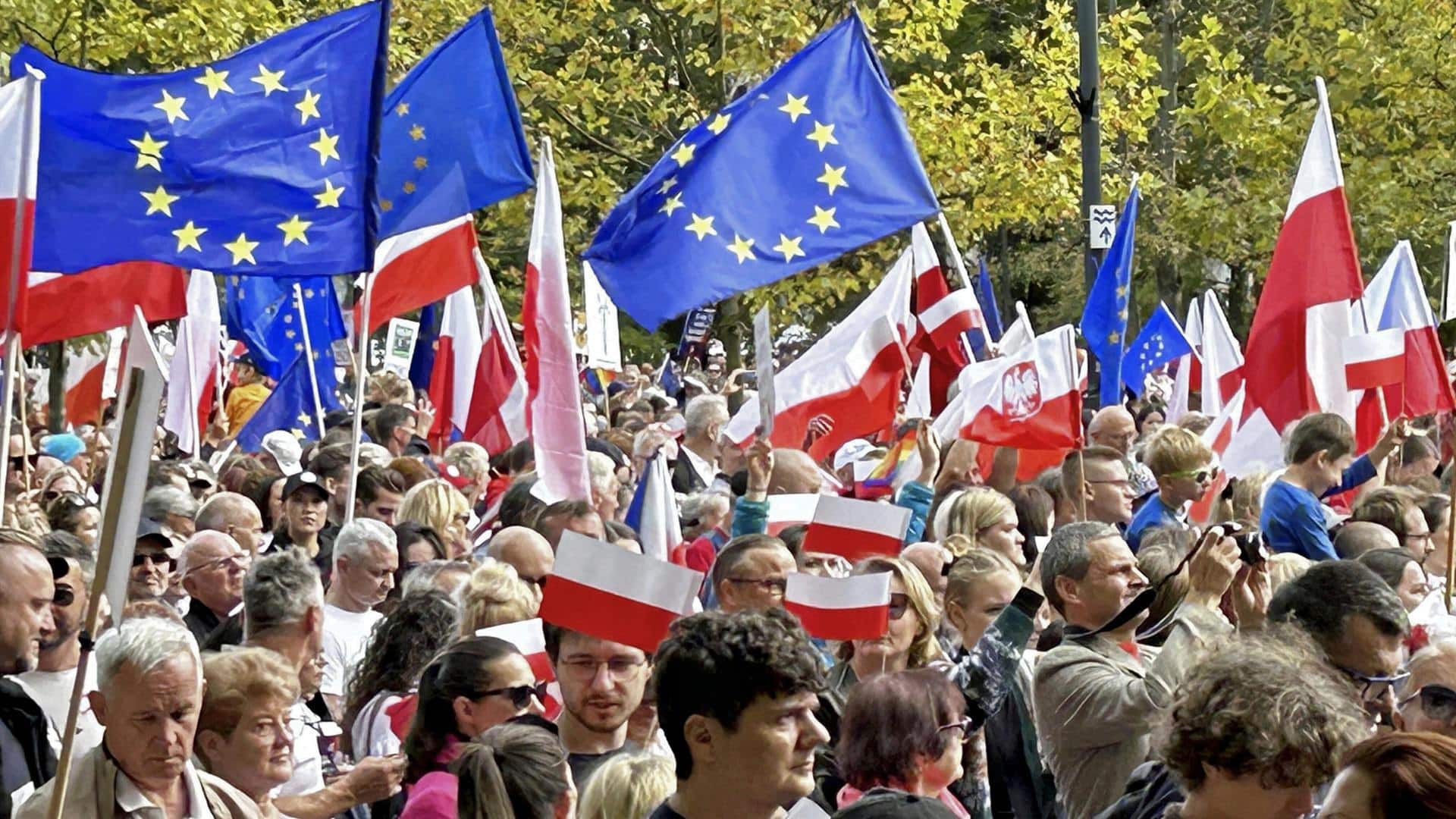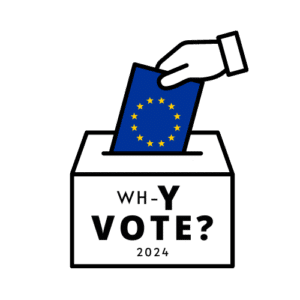Young people in Poland know that European integration is important. But they struggle to connect to political bodies that seem far away.

People wave both European and Polish flags at a rally conducted by opposition party ahead of the general election in Warsaw, Poland on 1 October 2023. (The Yomiuri Shimbun via AP Images)
Editor’s Note: This story, by correspondent Karolina Krakowiak, is the fifth article in our five-part Wh-Y Vote series that focuses on youth participation in the upcoming European elections.
Between 6 and 9 June, voters in all 27 countries of the European Union will go to polls to select representatives of the 700+-member European Parliament, the only directly-elected transnational assembly in the world.
The last EU election, in 2019, saw the first increase in voter turnout in 40 years. The leap to just over 50% was largely thanks to a so-called ‘youth surge’: namely a 12% increase in turnout among 25 to 39-year olds and a 14% increase among the under 25s.
Senior EU figures heralded the result as a new era of civic engagement and evidence of strengthened support for the EU. Yet, even with the increase, only half of eligible voters cast a ballot and turnout actually decreased in eight countries.
The 2024 election will include, for the first time, 16-year olds in Germany and Belgium, joining their Maltese and Austrian counterparts who were granted the vote in the 2000s.
 News Decoder’s Wh-Y Vote series aims to shed light on these questions by examining how young people across the European Union feel about the upcoming election. What influence do they believe the EU has on their lives? Why are young people voting or not voting? What are the issues driving them to or away from the polling station?
News Decoder’s Wh-Y Vote series aims to shed light on these questions by examining how young people across the European Union feel about the upcoming election. What influence do they believe the EU has on their lives? Why are young people voting or not voting? What are the issues driving them to or away from the polling station?
Correspondents based in France, Denmark, Hungary, Latvia and Poland have sought the views of young voters and non-voters as well as election experts in their respective countries and, over the course of five articles, will paint a nuanced and candid portrait of the state of the youth vote in the run up to polling day.
As the 2024 EU parliamentary elections approach, I find myself reflecting on their significance. What do these elections mean for us, the youth of Poland? I decided to ask my friends and peers about their thoughts on the upcoming elections. Their responses reflect a mix of hope, frustration and a sense of duty.
“I’m voting, of course,” said one friend, echoing a sentiment I often hear. “I always vote. But what’s the influence of my vote? EU elections feel distant. I see banners of politicians all over the city, but they tell me nothing. I detest campaign banners.”
The upcoming EU elections present a critical juncture for young Poles. A survey taken by the European Commission and published in April 2024 found that 69% of young people in Poland between the ages of 15 and 30 said they were eligible to vote and planned to do so. Only 9% of those who said they were eligible to vote said they did not plan to do so.
While there is a clear desire to participate, there is also a pervasive sense of disconnect and frustration. Young people are aware of the importance of their vote, especially in the context of rising right-wing sentiments and the need for a united Europe in turbulent times. However, logistical barriers, a lack of clear information and a feeling of distance from the EU’s workings are significant hurdles.
This frustration is common. Despite feeling informed enough to vote, many of my peers struggle to see how their choices will translate into tangible outcomes in Brussels.
Kuba, another friend, shared his logistical challenge: “I will not vote because I am going to Austria, and the nearest place to vote is 600 km away,” Kuba said. “We need voting committees in smaller regions abroad.”
This highlights a practical barrier to participation that affects many young Poles living abroad.
The pull of local politics
For some, like Dominika, local elections feel more immediate and relevant compared to the distant mechanics of the European Union; the European Commission is based in Brussels, Belgium while the European Parliament has its base in Strasbourg, France. “I plan to vote, but I do not have a special opinion,” she said. “ The more local elections are, the more interested I am in them.”
Maja added: “Sure, I’m going to vote, but I haven’t read much about it. I’ll vote according to my ‘Latarnik’ survey results.”
The “Latarnik Wyborczy” surveys, which help voters identify parties aligning with their views, are a common tool among Polish citizens. It allows someone to easily compare political views given by the election committees. How is it done? “Latarnik” prepares statements on the most important and current topics of public life. Then they are passed to election committees to refer to them to finally create a survey which compares your answers with the answers of the committees.
“I was much more interested in parliamentary elections in Poland,” Maja said. “Nevertheless, I know who is starting, from which party, but less about their roles in the EP.”
One friend emphasized the importance of European integration at a time of geopolitical instability. “Now, as never before, with what’s happening in the east, European integration is crucial,” he said. “We need to send people who will support it, not undermine it.”
Maja echoed a concern about the EU’s direction. “Given that Europe is leaning towards the right-wing lately, it’s more important to vote if you want the EU to remain as it is or become more integrated,” she said.
📣 FOUR REASONS WHY YOUR VOICE ON EUROPEAN ISSUES MATTERS 📣
1. Your freedom of movement
All citizens of EU member countries have the ability to live and work and travel freely anywhere in the EU.
2. Your education
The European Union allows its citizens to study at any EU university under the same conditions as nationals. Under the ERASMUS program, the EU spend 1.2 billion euros for university students to study in other countries. In 2022 alone, some 372,000 students took advantage of this program.
3. Your money
The politicians elected in the European Parliament help shape the EU budget deciding what issues to prioritise. The European Union has allocated 50 billion euros for Ukraine assistance and 118 billion euros for climate change initiatives. For youth in particular, the EU funds employment schemes, regional development programmes and urban regeneration projects.
4. Your rights
In March, the European Parliament passed a law that would ban artificial intelligence applications that violate citizen rights to privacy and their identities, such as the scraping of CCTV footage for facial recognition, and it would require transparency when AI is used. A new policy is pending approval by member states that would force manufacturers to provide easy ways to get products repaired and allow third parties access to spare parts needed to repair broken or damaged products.
An information vacuum
Piotrek summed up a common frustration. “I will vote according to my ‘Latarnik’ result but there’s little communication about what candidates want to do or their qualifications,” he said. “There’s no substantive information in the mainstream media.”
Taking under consideration the 10-year run of a right-wing party in Poland, I find the European elections important. Even though I understand the frustration of many towards left-wing parties, I will always support unity, equality and human rights — beliefs represented by the left-wing. I hope the EU will remain a beacon of these values, even with the recent shift towards right-wing politics.
As we approach the elections, it is crucial for candidates and political parties to address these concerns, providing clear, accessible information and making voting more accessible for those abroad. The youth vote is not just a demographic; it is the future of the European Union. The voices of young Poles must be heard, and their participation facilitated to ensure a more inclusive and representative union.
In the coming months, as Poland’s youth prepares to cast their votes, the question remains: Will the EU elections meet their expectations and address their concerns? The answer to that will shape not only the future of Poland but the entire European Union.
Three questions to consider:
- What is one reason many Polish youth feel compelled to vote in the European election?
- What makes choosing candidates difficult for some young voters in Poland?
- How do you think integration with Europe could benefit a country like Poland?

Karolina Krakowiak is News Decoder’s Project Management Intern for The Writing’s on the Wall. Leaving engineering behind and following her passion, Karo decided to move to Paris and pursue a Master’s degree in International Management and Sustainability at the American University in Paris. Both in her professional and private life, she prioritizes nature, kindness and mindfulness.
Wh-Y Vote 2024 is funded by the European Union. Views and opinions expressed are however those of the author only and do not necessarily reflect those of the European Union or the Directorate General for Communications Networks, Content and Technology. Neither the European Union nor the granting authority can be held responsible for them.

